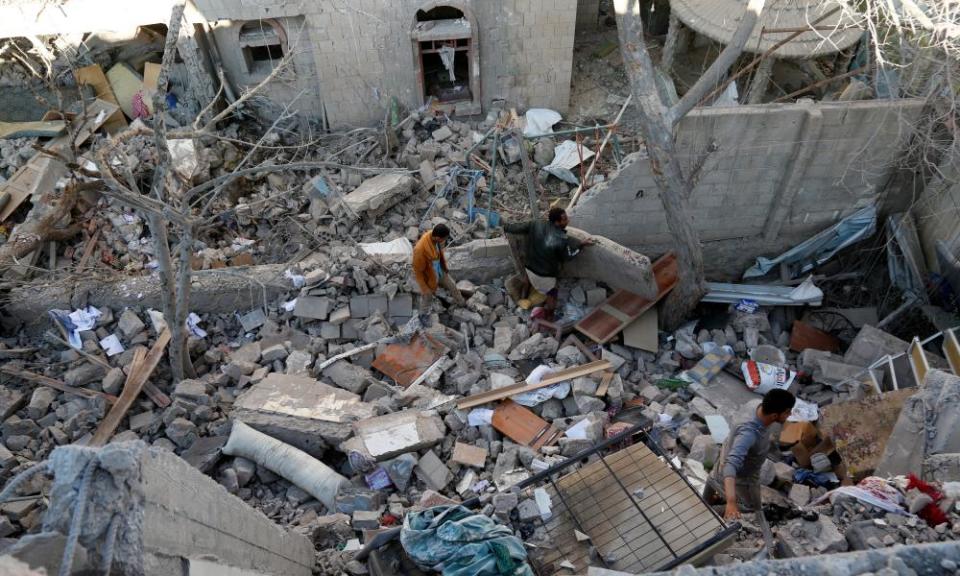Why is the UK government still getting away with complicity in the Yemen war?

This is a far greater scandal than the parties in Downing Street. In a just world, it would prove the downfall of our prime minister. This week, airstrikes by the Saudis and their allies killed more than a dozen people in Yemen, civilians among them. Last month an estimated 32 civilians died as a result of the ongoing conflict. The country has been convulsed by civil war since 2014. For seven years, a Saudi-led coalition has been pummelling the impoverished country with bombs, many of them supplied by Britain. Through our staunch military alliance with the Saudi dictatorship, our government is directly complicit with these atrocities.
You can be forgiven for knowing nothing about any of this: Yemen does not matter, you see. Its people have been relegated to the bottom of the hierarchy of death, and most of our media show little interest in scrutinising our government for slaughter that it is directly complicit in. The Saudi violence has only increased in Yemen since October, after the UN human rights council voted to end its war crimes investigation following intensive lobbying by the dictatorship in Riyadh.
If Yemen is no longer the world’s worst humanitarian crisis, that is not because its plight has improved, but because the western blockade of Afghanistan has taken centre stage. Last September, the UN warned that millions of Yemenis were “a step away from starvation” as the “country’s economy has reached new depths of collapse”, while over Christmas rations for 8 million Yemenis blighted by hunger were cut.
Yet our government retains its tight alliance with the Saudi regime, which decapitates gay people and dissidents, brutalises women and provides, in words purportedly of Hillary Clinton, “clandestine financial and logistical support” to terrorists. This is the regime that chopped a journalist into pieces in a foreign embassy, and incinerated Yemeni children travelling on a school bus on their way back from a picnic – an “apparent war crime”, in the words of Human Rights Watch.
That isn’t to say the Saudi-led forces are responsible for criminal acts alone. The courageous Mwatana for Human Rights organisation based in Yemen’s capital Sana’a scrutinises violations committed by all sides, including the Iranian-backed Houthis who control much of the country. What matters is that our government is directly arming and supporting one side, and therefore bears direct responsibility for their actions.
Related: UN-backed investigator into possible Yemen war crimes targeted by spyware
If it wasn’t for the stubborn and diligent work of the UK campaign group, Campaign Against Arms Trade (CAAT), there would be practically no consistent scrutiny of our government’s role at all. According to its research, BAE systems has sold £17.6bn arms and military services to the Saudi dictatorship since 2015, while the company has 6,700 members of staff posted in Saudi Arabia. Thanks to a judicial review brought by CAAT in 2019, the court of appeal found that the British government’s decision to keep licensing military equipment to Saudi Arabia was unlawful, but the government resumed arms sales after arguing only “isolated incidents” of airstrikes violated humanitarian law.
CAAT’s court battle goes on. “There have been no efforts to ease or lift the blockade,” its research coordinator Sam Perlo-Freeman told me. “The Saudis are maintaining it without suffering any consequences or diplomatic efforts. The attention given by the world’s powers to end the war or at the least the humanitarian crisis in Yemen is woefully inadequate to nonexistent.” While it continues to arm and back the Saudi war effort, Britain slashed its humanitarian aid to Yemen by half in 2021, while the World Food Programme warns it cannot feed Yemenis properly because of funding shortfalls.
CAAT and other human rights organisations should not be carrying this burden alone. Yemeni lives do matter, despite the silence that suggests otherwise, and our government must be held to account for its complicity in this horror. So yes, we should all be furious at our rulers partying and boozing while ordinary citizens couldn’t hold the hands of dying relatives. But our government’s direct involvement in the massacre of civilians by one of the world’s most repulsive dictatorships is an even graver crime. It is our failure to speak up that allows the killing to go on.
Owen Jones is a Guardian columnist

 Yahoo Movies
Yahoo Movies 